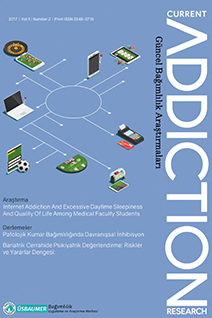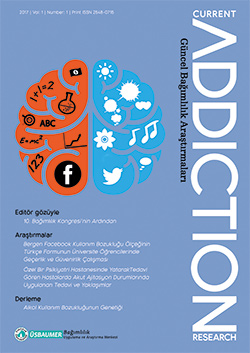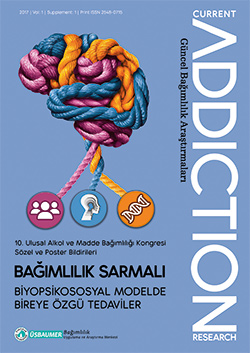Years
2022
2021
2020
2018
Categories
Authors
ARTICLES
Original Article
Ali Yücel GÜLER,Gül ERYILMAZ,Nilüfer SAATCİOĞLU TINKIR
2022, 6(1), s:5-12
Case Report
Are there any connections between kleptomania and addiction?
Gül ERYILMAZ,Alptekin ÇETİN
2021, 5(2), s:33-34
Kleptomania is a clinical condition in which the desire to steal different objects cannot be inhibited regardless of value. It is classified as “impulse control disorder” in DSM 5. A 24-year-old patient with alcohol use disorder developed kleptomania after successful treatment. In this case, kleptomania can also be evaluated from the perspective of addiction.
Original Article
Nilüfer SAATCİOĞLU TINKIR,Gül ERYILMAZ
2021, 5(1), s:5-15
Original Article
Evaluation of the Factors Predicting Risky Alcohol Use in University Students
Deniz Eryılmaz,Işıl Gogcegoz,Gul Eryılmaz
2020, 4(1), s:16-20
problem in terms of mental health of the individuals and society. Substance use disorder has been evaluted as a disease by the World Health Organization (DSÖ) from 1951. In terms of alcohol consumption Turkey 4.7% of all deaths in men with prevention of alcohol consumption is predicted of 3.1% of all deaths in women could be prevented. When we analyzed the alcohol consumption in Turkey it’s thought that 4.7% of male deaths, and 3.1% of female deaths could be prevented through prevention of alcohol consumption. Risky alcohol use can be defined as the consumption of alcohol at the risk of harm in physical, mental or social areas. Participants of this study are the students at Üsküdar University in the 2018-2019 academic year. The Alcohol Use Disorders Identification Test was used to determine the alcohol use levels of the participants and to determine the risky alcohol use. According to the results of this study, the rate of individuals who have risky alcohol use is 6.3%. Risky alcohol use has become an important public health problem in terms of mental health of individuals and society.
Review Article
Gül Eryılmaz,Işıl Göğcegöz
2018, 2(2), s:59-61
Pathological gambling is a mental disorder characterized that might cause significant decrements in social, vocational and family life. In this report, addictive gambling behavior, which may be called secondary or iatrogenic, has been reviewed.
Case Report
Gambling Disorder Following Bariatric Surgery
Gül Eryılmaz,Cemal Onur Noyan
2018, 2(2), s:62-63
Pathological gambling is defined as persistent and repetitive gambling behaviors, characterized by the inability to control the gambling behavior of the individual, family or professional functionality. It is stated that the possibility of occurrence of alcohol and substance use disorders is increased after obesity operations, which have been frequently applied in recent years. Until now, gambling disorder, which is considered as impulse control disorder, is evaluated under the category of addiction behaviors with DSM-5. In this case report, the case of gambling disorder following bariatric surgery will be discussed.



 2. Sayı
2. Sayı
 1. Sayı
1. Sayı
 Ek Sayı
Ek Sayı







